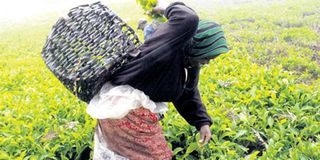Why we should focus on marketing Kenyan products to rest of the world

Picking tea in Kenya. In Kazakhstan, tea is taken at breakfast, lunch, dinner.
What you need to know:
- The world market is open for business, yet our leaders are busy cutting debatable deals in the region.
The Kazakh people often remind me of Kenyans from the rural areas. Coming from a nomadic pastoralist background, they are warm, hospitable and have a deep relationship with tea, which they call “chai” in Russian. Chai is served all the time, and as often as possible. People drink it black with no sugar, black with sugar, or with lots of milk.
I spent a few days back in Kazakhstan recently, in more relaxed and informal settings than during my previous visit in January — when temperatures were averaging -35 degrees Celsius in Astana, the capital. This time — the end of summer — the weather was way less hostile, but the winds in the evenings could chill the bones.
I make a point of taking Kenyan gifts of coffee, tea and macadamia nuts when I travel; hoping to do my small part promoting some of the great things Kenya has to offer. During my January visit, I gave away gifts of coffee, tea and macadamia nuts.
And I was really thrilled to get e-mails asking for more from my friends and colleagues in Kazakhstan when they heard I could be returning in the late summer. And I must say that the Kericho Gold brand of tea was the pick of the bunch. And no, I have no interests in, nor do I know who makes, Kericho Gold Tea!
IDEAL MARKET
We can do far better than the few packets that the rare Kenyan visitor to Kazakhstan takes when they visit. A country with the sort of love affair with tea that Kazakhstan has — tea for breakfast, during morning breaks, after lunch and after dinner — should be a prime target for our businesses.
And especially when it has a growing economy and rising living standards, just on the verge of being a developed country and with nouveau riche tastes.
And it’s not just tea. Kazakhstan seems an ideal market for flowers, horticulture and nuts. Its citizens travel often for holiday to Dubai, Turkey and Europe and we could also tap into this culture of tourism.
For really, few countries can match what we have to offer tourists, with our wildlife, birds, nature, archaeological history, beaches and culture.
But we seem to lack the global ambition to be among the best, content to focus on East Africa as our baseline. Kazakhstan got independence a mere 25 years ago following the collapse of the Soviet Union.
SPECIAL BRANDS
For the first five to seven years, life was tough and hard and rough, as it tried to shift from being a supply region for the Soviet Union whose indigenous people were treated as second class citizens by the Russians who dominated every republic in the USSR.
Today, Kazakhstan has the ambition to be one of the top 30 countries in the world by 2050. There is significant corruption in Kazakhstan, but a substantial portion of the oil wealth has been used in the country, including building a spanking and gleaming new capital of Astana since 1997.
With the quality of our tea and coffee, it is dismaying that we have not done much to brand and niche our products better. If the world can talk about Swiss chocolate (even when they don’t produce cocoa), French wine, Belgian beer, Italian leather and Thai rice, why can’t we have Kenyan coffee and tea as special brands? Heck, Ethiopia is already branding its coffee as unique, and we hear of Turkish coffee when they have no coffee growing anywhere in Turkey!
Beyond branding our raw materials, we should also focus on more value added goods in the same way we talk about Japanese cars, Korean electronic gadgets, American cellphones, German luxury cars, French fashion.
Perhaps the Kenyatta regime could focus more on these sorts of economic deals, looking at expanding our markets in regions we don’t often think about, and moving us into more value added trade, rather than working on sugar-for-dairy deals with Uganda that raise more questions than answers.





